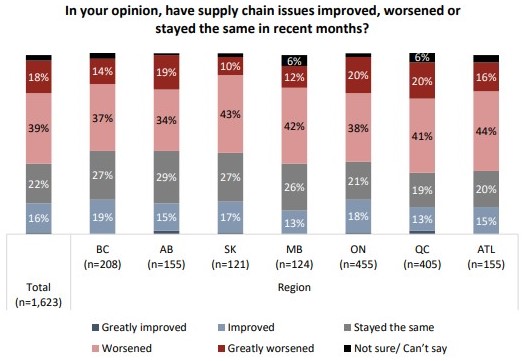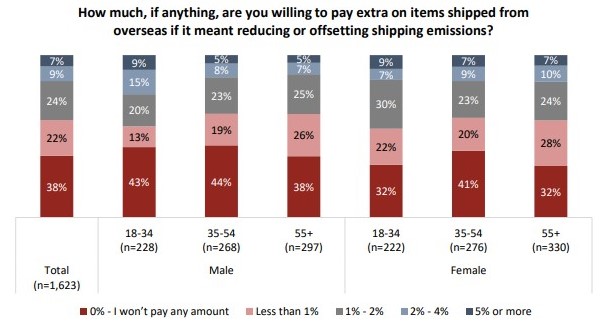The fourth Canada-wide survey by the Angus Reid Institute (ARI), in partnership with Clear Seas Centre for Responsible Marine Shipping (Clear Seas), finds a growing proportion of Canadians mindful of the crucial role marine shipping plays in delivering goods.
Key highlights
- Fewer than one-in-five (17%) believe Canada should prioritize reducing greenhouse gas emissions in shipping above other industries. More instead believe it should have equal (42%) or low (28%) priority when compared to other industries.
- Amid a cost-of-living crisis, two-in-five (38%) say they would not pay any additional amount on goods shipped from overseas if it meant reducing or offsetting emissions. Another one-in-five (22%) say they would pay less than one per cent.
- Majorities believe the Canadian Coast Guard (69%), Canada’s port and harbour authorities (62%) and the shipping industry in general (59%) are doing a good job contributing towards safe shipping in Canadian waters. Provincial governments (49%), federal departments managing the industry (49%), and the federal government more generally (44%) receive less praise.
According to the report, whether it is a shortage of children’s Tylenol or delays in getting new vehicles, Canadians are increasingly aware of the relentless supply chain crunch.
Supply chain disruptions have boosted awareness of shipping
More specifically, a stubborn feature of the pandemic has been the relentless congestion in the supply chain that has affected trade networks and consumers around the globe. As a result, Canadians are much more aware of the fact that 70 to 80% of materials and consumer goods are brought by ship than they have been in recent years.
In fact, a third (34%) of Canadians now recognize that most products they use daily are transported by sea, representing a 55% increase in awareness compared to 2020.
Furthermore, global issues such as inflation, Russia’s invasion of Ukraine, and the COVID-19 pandemic have increased their level of consciousness of the workings of the global network of goods.
Additionally, Canadians are more likely to feel the supply chain woes have increased in recent months. Three-in-five (57%) believe supply chain issues have worsened. Fewer than one-in-five (17%) have noticed improvement. Those in Alberta (19%), Ontario (20%) and Quebec (20%) are most likely to believe the supply chain issues have become much worse in recent months:

Finally, there is a growing belief that shipping is increasing in importance in recent years. Three-in-five (62%) believe marine shipping has been growing in importance over the past 20 years. In 2016, that figure was two-in-five (43%).
Oil spills and pollution from ships remain top concerns for Canadians
While 91% of Canadians give the shipping industry a high mark on safety, common concerns about its impact on the environment remain, especially on the issue of marine pollution. Most Canadians still voice concerns over the risk of oil spills and harm to marine life, with an increased concern about waste dumped from ships.
Despite those ongoing concerns, fewer Canadians fall into the Cautious Critics group on the Shipping Confidence Index in 2022 than two years ago, when the Index was developed.
Tackling greenhouse gases: Most Canadians are willing to pay more to cut emissions
A majority (59%) of Canadians think that reducing greenhouse gas emissions from the marine industry is as or more important than other industries. Despite the overall rise in the cost of living, nearly two-thirds (62%) say they would pay more for goods from overseas to reduce or offset emissions.
Moreover, one-in-five (22%) say they would pay less than 1% more. One-quarter (24%) say they would pay between 1-2%, while one-in-six (16%) are willing to pay 2% or more.
Men are much more likely than women to say they will not pay any amount extra to offset emissions from the marine shipping industry. However, men aged 18- to 34-years-old are the most likely demographic to say they would pay two per cent or more on items from overseas if it meant reduced emissions:

Shipping Confidence Index
In order to better understand Canadian perspectives on the marine shipping industry, the ARI developed the Shipping Confidence Index in 2020 which analyzed respondents’ views on shipping safety and regulation and relative importance of the industry to the economy.
The Shipping Confidence Index is comprised of three groups: Shipping Supporters, Maritime Moderates, and Cautious Critics.
- Shipping Supporters (33%) perceive the shipping industry as “critically” or “very” important for the federal economy as well as their own provincial economy, and international trade. This group tends to assign higher priority to the economic considerations of marine shipping over potential environmental risks.
- Maritime Moderates (42%), as their name suggests, represent an ideological centre between the other two groups. Although mostly confident about overall safety and regulation, Moderates are divided on other aspects related to marine shipping in Canada, including assessments of shipping petroleum in Canadian waters.
- Of the three groups, Cautious Critics (25%) express the highest rates of skepticism when it comes to the importance of the industry and its overall safety. This group is also defined by high levels of concern related to the environmental risks of the industry.






























































